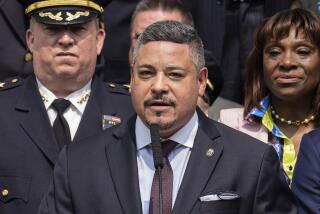PERSPECTIVE ON GOVERNMENT : When Politicians Pass the Buck, the Outcome Isn’t Ordained : Special investigating commissions needn’t fail, says the man who broke the story on New York’s 1970 cop scandal.
- Share via
When politicians face social problems that they don’t know how to handle, they often create study commissions. The announced goal of most of these bodies is to examine the crisis of the moment and to recommend solutions. The unspoken goal is to deflect heat from the politicians who were on duty when the crisis erupted.
Following this formulation, Mayor Tom Bradley can soon be expected to appoint a special commission to examine the causes of illegal police violence in Los Angeles and how to control it.
It is easy to be cynical about special commissions. After all, most of them don’t work very well, partly because the public understands the self-serving motives that usually play a role in their creation. But the major reason that commissions engender skepticism is that they seldom are able to devise the quick solutions that are desired. Given the profound problems that most commissions are asked to resolve, this kind of failure is hardly surprising.
One thinks of President Johnson’s commission on crime or Polish President Lech Walesa’s announcement just last week that he was forming a study commission to investigate anti-Semitism in Poland.
It is well, however, not to become too cynical. Sometimes, with a lot of luck and political skill, a commission can make a real contribution to a community. One of the most successful such operations was the Knapp Commission, a body created in 1970 by John Lindsay, then the mayor of New York. Lindsay acted after I wrote a series of stories for the New York Times, charging that the police department was profoundly corrupt and, more important, that top officials had closed their eyes to specific acts of corruption when brought to their attention, in part by frustrated police whistle-blowers Frank Serpico and David Durk.
The commission soon became known by the name of its chairman, lawyer Whitman Knapp, now a federal judge.
Although the commission was largely successful, it faced extraordinary obstacles. For example, Lindsay mounted a determined underground effort to prevent investigation of the failure of key figures in his administration, including Police Commissioner Howard R. Leary, to deal with an epidemic of corruption that the Knapp Commission later concluded had infected “a sizable majority of those on the force.”
The question of how high and wide the investigation would go was important in New York and is likely to be so in Los Angeles. After all, police brutality, like widespread corruption, is not just the product of the moral collapse of individual officers, the ubiquitous “rotten apples.” Indicting a few officers may be appropriate. But brutality and corruption breed in environments where the leadership of the department, and in some cases of the whole city, has failed. Those who allowed the deployment of officers without proper training and supervision must be held accountable.
The question of funding was also a sword over the Knapp Commission’s head.
Shortly after the mayor’s appointment of the commission, a cowed City Council voted $325,000 to fund the investigation for the remaining seven months of 1970. With the new year, however, the council caved in to police lobbying and refused to provide more money. Knapp, determined to complete the commission’s work, requested and got a $215,000 grant from the Nixon Administration’s Law Enforcement Assistance Administration. Some cynics believed the grant reflected Nixon’s uneasiness about Lindsay, who until that time had looked like a highly successful mayor and a long-shot threat to the President’s renomination.
But the long-term success of the Knapp Commission rested on something more immediate and tangible than political calculation. Five months after my April series of articles, Howard Leary, the police commissioner, resigned. In one of those flukes of history, Leary was replaced by Patrick V. Murphy, who became arguably the most accomplished police administrator in post-World War II America.
Among the reasons for Murphy’s success was, I think, his unique perspective on the 30,000-officer New York Police Department. Because he had been a patrolman and a junior officer in the city and because his father had been a patrolman, Murphy fully understood the department’s quirky character. But because he also had headed police departments in Buffalo, Detroit and Washington, he was not a captive of one of the oldest and largest bureaucracies in the United States.
Relations between the new police commissioner and the commission chairman were not easy. Murphy, while pushing dramatic changes in how the department trained and supervised its officers, also had to defend the force’s honor. But both men avoided real confrontation and continued the process of rebuilding the New York Police Department.
The result of the unlikely and mostly unspoken partnership between Whitman Knapp and Patrick Murphy was not perfection. And all government agencies need constant public attention. But most people agree that the determination and political skills of the patrician Wall Street lawyer and the knowledge and administrative genius of the street-smart police executive vastly improved the services provided the 8 million people of New York City. And that is no small achievement.
More to Read
Get the L.A. Times Politics newsletter
Deeply reported insights into legislation, politics and policy from Sacramento, Washington and beyond. In your inbox three times per week.
You may occasionally receive promotional content from the Los Angeles Times.










